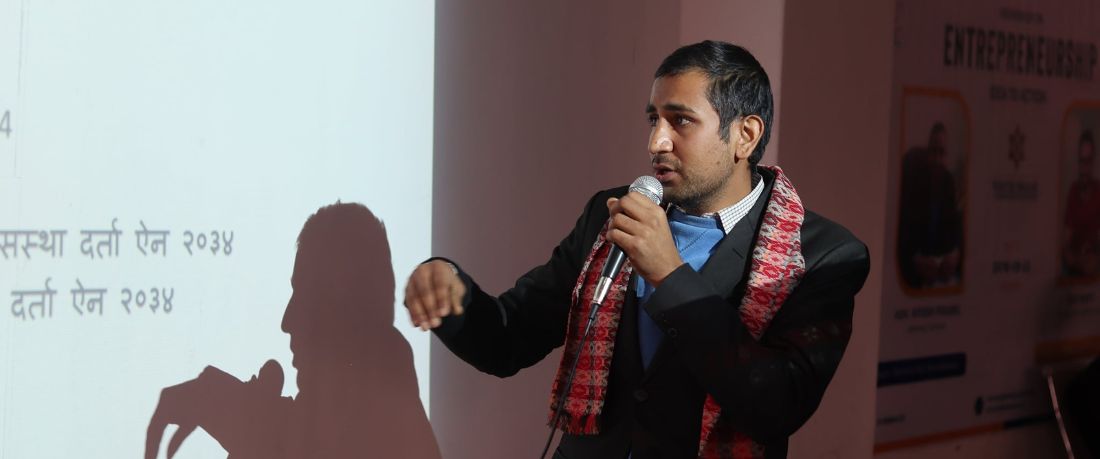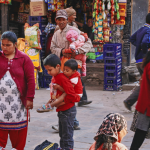After over seven decades of political instability and socio-economic disruption, the people of Nepal gave themselves a new Constitution in 2015. Its advent guaranteed economic, social, and cultural rights (ESCR) as fundamental rights in the country.
In October 2022, Ritesh Poudyal, a practising lawyer with experience in diverse fields of law, joined iProbono’s Economic, Social and Cultural Rights fellowship. He spoke to Krishna Sharma, a Justice Leila Seth Fellow from India, about his inspiration to work on human rights issues, expectations from the ESCR fellowship, experience of teaching law, and giving back to the Nepali people.
Here are some excerpts from the interview:
What are your expectations from the ESCR fellowship?
The ESCR fellowship is an opportunity for legal professionals to contribute in the field of law and legal research. It promotes the realisation of economic, social and cultural rights for the people of Nepal. The fellowship provides a unique opportunity to get mentorship from experienced lawyers and activists working in this field. It will help me build and sharpen my skills in litigation, research, writing, and public speaking. To sum up, it will ensure both personal and professional growth for me.
What was your motivation to join the ESCR fellowship?
Since I joined the profession, I have worked in various fields of law, such as civil and criminal litigation, corporate law, and human rights. As a result, I was unsure about the area I should build my expertise in.
I believe that this fellowship will give me that clarity. It is an opportunity to get mentorship from Advocate Raju Chapagai, who is a renowned constitutional and human rights lawyer from Nepal. Raju Ji has been a great mentor. He has helped me with several resources, knowledge, and guidance on the issues I’m working on in this fellowship. He recently filed a public interest litigation (PIL) on a very important issue of policy-level corruption, which is rampant in Nepal. Through his PIL, he emphasised the need of a law to control and keep a check on corruption.
iProbono has done a great job by providing us with such mentorship in the fellowship.
What continues to push me are the people I work with, specifically Barun Ghimire and Bandana Upreti, both of whom motivated me to take up the fellowship and are a constant source of support.
Moreover, the work of the previous batch of fellows on issues like migration and the regulation of online classes during the COVID-19 pandemic also inspired me. During the COVID-19 pandemic, I was the first person to file a PIL in Nepal, urging the government to bring back Nepali students who were stuck in China at the time. In a show cause order, the court observed that meeting with the family and meeting with parents can also come under economic, social and cultural rights, and the government should, therefore, bring Nepalese citizens in China back to the country. The government then brought back citizens on a chartered plane.
I also admire and look up to Anurag Devkota and Prabin Subedi, with whom I have worked on issues related to children, migrant workers, and other human rights. All these people and issues motivated me to take up this fellowship.
Could you elaborate on ESCR rights in Nepal’s Constitution?
I personally believe that Nepal’s Constitution is one of the best in the world. Historically, movements like Maosist and Madhesh have helped people realise the importance of economic, social and cultural rights to some extent.
As you may know, Nepal has had seven constitutions in the last seven decades. Our Constitution has seen a lot, it reflects this. It is a Constitution that is drafted by the representatives of the people and is for the people. What makes it unique is that it expressly guarantees a wide range of social, economic and cultural rights. The interim Constitution of Nepal in 2007 guaranteed very few social, economic and cultural rights, whereas the current Constitution guarantees a wide range of rights such as consumer rights, health and sanitation rights, senior citizens’ rights, and the rights of Dalits and other marginalised communities. After the Constitution came into force, these rights were made accessible through specific legislations, such as the Social Security Act, Right To Information Act, Rights of Persons With Disabilities Act, etc. All these laws were enacted in 2018. Due to these efforts, ESCR are now justiciable in a court of law in Nepal.
What areas of ESCR would you be focusing on during your fellowship?
Broadly, access to justice is what I would like to work on through this fellowship. I’m particularly keen on understanding what access to justice looks like for marginalised and vulnerable communities in Nepal. Raju Ji gave me clarity on this.
I’d also like to work on securing the rights of persons with disabilities. My focus will be on the implementation of laws. Even though laws provide for reasonable accommodations, we hardly see them in practice. There are rarely lifts or ramps for people with disabilities. Even when available, they are often not accessible to people with disabilities.
I’m also interested in working on the right to work, especially since many Nepali people lost their jobs during the pandemic. I think Raju Ji’s guidance will be helpful in understanding these issues and narrowing down the issue I will work on.
You have filed several interesting PILs in your career. Could you tell us more about them and your experience with strategic litigation?
Before I joined the fellowship, I had filed a few PILs on different issues, such as the regulation of online education during the COVID-19 pandemic and the right to freedom of expression.
One of the cases I filed was to do with PlayerUnkown’s Battlegrounds (PUBG). PUBG is one of the most popular online games in the world, with almost 400 million players worldwide. In Nepal, teachers and parents had been demanding a ban on PUBG due to the negative impact of the game on the sleeping pattern and studies of students. We came across the news that many of these students had been dying by suicide in reaction to this. We also found that this was the case in other South Asian countries as well. So, we filed a PIL arguing that playing games is a facet of the right to freedom of expression under Article 17 of the Constitution of Nepal. The apex court accepted our argument, stating that playing games does not have any mental or psychological effects, rather, it helps boost the creativity of students and enhances networking skills. In the landmark case, the court ruled that playing games is part of the right to freedom of expression.
I also joined a PIL filed by Barun Ghimire, Alok Pokharel, and a few of the previous fellows to regulate online classes during the pandemic. I was one of the applicants and we also tried to plead that case. Our main contention was that teaching on online platforms creates a disparity between students. However, in my opinion, the court did not fully understand the digital divide and a positive judgment was not rendered.
You also teach law part-time. What do you enjoy about it? Could you share your experience with us?
I feel that the legal profession, particularly court practice, is one of the most difficult professions. I always felt that teaching plays an important part in a law student’s life. It is a way to interact with young minds. It’s really motivating when I come across different perspectives, fresh ideas and arguments from students. For me, it’s also a way to give back by sharing my practical knowledge. This helps in bridging the gap between the theoretical and practical aspects of law, which our education system doesn’t prioritise enough. I feel this will encourage students to come up with pragmatic approaches when they enter the profession. Additionally, it also ensures I brush up on my knowledge regularly.
How do you think this fellowship will influence your career plans in the future?
It’s a difficult question to answer at this moment. My fellowship has just started and I’m figuring out the issue I will develop. Whichever issue I settle on, I’d like to build my expertise in it over time. My work in this fellowship will help me build my expertise. That said, the fellowship is offering me a unique opportunity to dive into new areas of law. I’ll try to make the best use of it. Along the way, I hope to further develop my skills in litigation, research, advocacy, and legal writing as a practising lawyer and also develop leadership skills. I’m excited to create an impact on the courts and society through this fellowship.
Krishna Sharma – Justice Leila Seth Fellow







